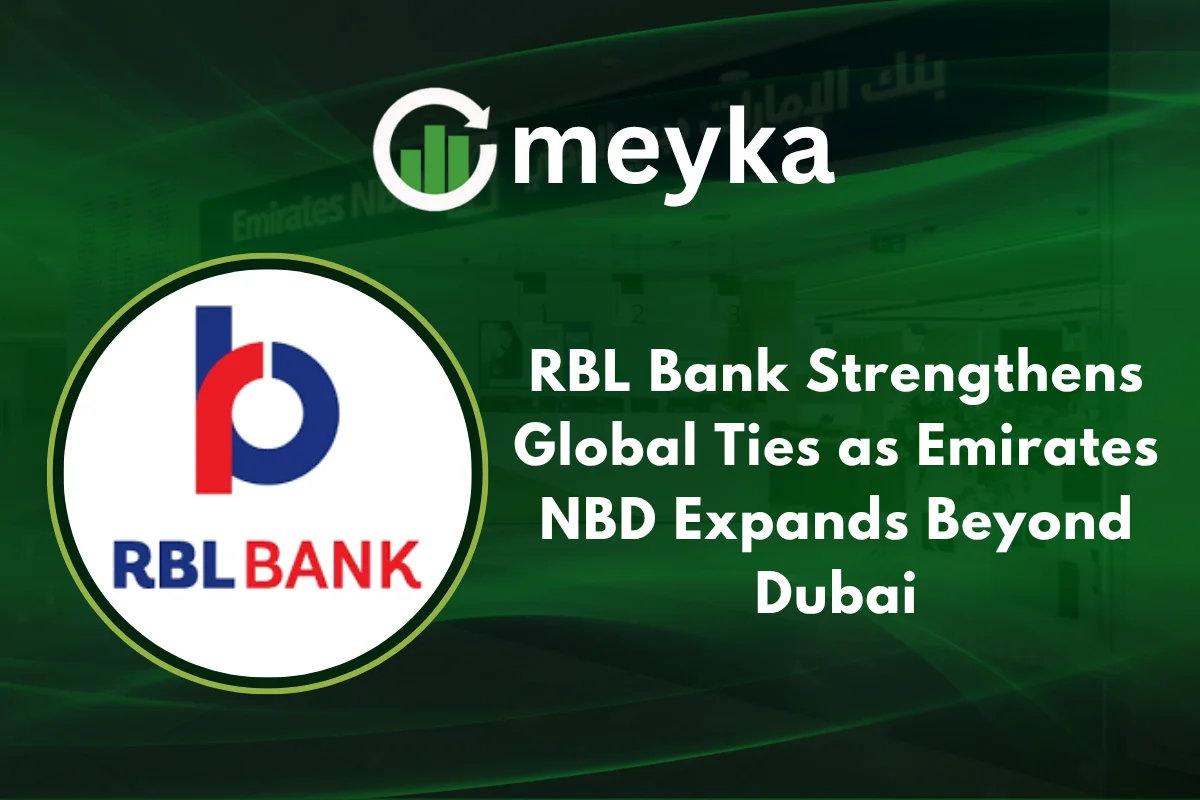RBL Bank Strengthens Global Ties as Emirates NBD Expands Beyond Dubai
In a dramatic turn that could reshape India-Middle East banking dynamics, RBL Bank finds itself at the heart of a potential landmark cross-border deal. Emirates NBD, the UAE’s banking powerhouse, is in advanced negotiations to acquire a controlling stake in the Indian private sector lender. This development signals both global ambition for Emirates NBD and an inflection point for RBL Bank’s growth trajectory and investor confidence.
Strategic Overview: Why Emirates NBD Eyes RBL Bank
Emirates NBD has long planned to expand beyond its Middle East stronghold. It already holds operations in 13 countries across the MENAT (Middle East, North Africa & Türkiye) region and has established footprints in India.
By turning its attention to RBL Bank, Emirates NBD would gain access to India’s fast-growing retail and credit markets. India remains one of the few major economies where banking penetration is still expanding, and a foreign-backed institution with deep capital reserves could catalyze innovation and risk-taking in underserved segments.
Sources report that Emirates NBD is structuring its entry via a preferential allotment of equity and warrants, with an initial stake of up to 25 %, followed by an open offer for an additional 26 % to reach a controlling stake of 51 %.
RBI appears to be open to approving this deal under exceptional conditions. India’s current rules restrict a single foreign entity’s shareholding to 15 % unless specifically cleared by the regulator.
If successful, the deal would position Emirates NBD as the promoter of RBL Bank, a rare case of foreign control in Indian banking.
Impact on RBL Bank: Capital, Governance & Strategic Opportunities
1. Capital Infusion & Balance Sheet Strengthening
RBL Bank has struggled in recent quarters. Its net interest income fell 13 % year-on-year, and net profit declined sharply in Q1 FY26. The reported ₹15,000 crore (approx. $1.7 billion) equity infusion could drastically improve capital adequacy, enable fresh lending, reduce the cost of funds, and absorb non-performing assets (NPAs).
2. Governance & Risk Management Boost
A strong foreign promoter brings disciplined governance, risk oversight, and global best practices. Analysts expect improvements in credit underwriting, internal controls, and compliance.
3. Access to Technology, Products & Markets
Emirates NBD’s network, fintech investments, and product synergies can help RBL scale in offerings like digital banking, trade finance, cross-border remittances, and Islamic banking. It may unlock UAE–India corridors, especially in remittance flows. India received over $38.7 billion from Gulf countries in FY24, half from the UAE.
4. Brand Perception & Investor Confidence
Market reaction has already turned bullish. RBL’s shares surged over 3 % on deal news, reaching a 21-month high. The presence of a global institutional investor helps reduce volatility and strengthens investor trust.
Regulatory & Market Constraints
Foreign Ownership Limits & Voting Caps
While India allows up to 74% foreign investment in private banks, voting rights caps and promoter norms complicate such an acquisition. Under current RBI stipulations, the acquirer’s voting rights may be capped at 26%, even if economic interest is higher.
Takeover Norms & Open Offer Obligations
Under Indian takeover regulations, crossing the 25% threshold triggers a mandatory open offer for an additional 26% to public shareholders. This ensures an opportunity for minority holders to exit at similar terms.
Regulatory Approvals & Timing Risks
Formal approvals from the RBI, SEBI, and possibly the Finance Ministry will be critical. Although informal support appears present, formal sanctioning could take weeks.
Valuation Risk & Integration Challenges
Valuation of RBL might be contested. Integration across culture, technology, systems, and risk frameworks will present nontrivial challenges, especially in a market as diverse as India.
Implications for Stock Markets & AI & Tech Investors
For Indian equity markets and AI stocks:
- RBL as a deep-value turnaround play: With strong foreign backing, RBL may re-enter favor among institutional investors, including those scanning stock market screens for turnaround stories.
- Fintech / AI tie-ins: RBL could leverage AI-driven credit scoring, generative analytics, and fraud monitoring systems from Emirates NBD’s global ecosystem.
- Sector ripple effects: Rival mid-tier banks may come under pressure to seek global or domestic alliances to remain competitive.
Investors doing stock research should factor in the dilution, capital structure changes, risk governance uplift, and timeline of integration.
Why This Deal Matters for India-UAE Banking Relations
1. Strengthening Financial Diplomacy
This potential deal advances deeper India–UAE financial integration. It reflects mutual trust and recognition of India’s capital markets as a destination for quality offshore investment.
2. Encouraging Foreign Capital Inflows
RBI’s openness to such a transaction signposts newer paths for foreign capital into Indian banking. The success of this deal could embolden other global banks to explore Indian acquisitions, reminiscent of how SMBC acquired a stake in Yes Bank recently.
3. Remittance Corridor Optimization
India’s massive remittance flows from the Gulf may find efficiency gains and lower costs via an integrated bilateral banking infrastructure backed by a major UAE bank.
Potential Risks & Red Flags
- Regulatory delays: Approvals may face objections or delays, which could spook investors.
- Cultural mismatch: Integration across geographies, languages, and business norms can strain execution.
- Dilution & minority dissent: Existing shareholders might resist dilution if they don’t feel adequately compensated.
- Overleveraging new growth: If RBL expands credit aggressively without underwriting discipline, NPAs might worsen.
Weighing this against the upside, many see this as a bold but calculated bet.
Conclusion
With this proposed transaction, RBL Bank stands at a crossroads. If the deal fully materializes, it would transform RBL from a domestic mid-tier player into a high-potential growth engine backed by global capital, governance, and strategic vision. For Emirates NBD, it’s an opportunity to leapfrog into India’s banking core, obtaining not just clientele, but ambition.
For investors, the convergence of stock market opportunity, AI-enabled banking trends, and global capital flows makes this a rare multi-dimensional play. RBL Bank’s strength now lies not just in its balance sheet or credit growth trajectory, but in its ability to integrate, adapt, and deliver under this new partnership.
FAQs
Yes, if the transaction concludes as planned, Emirates NBD may acquire 25% via preferential allotment and make an open offer for another 26%, resulting in a total stake of around 51%.
Existing shareholders may participate in the open offer to exit at similar pricing or retain a diluted stake under new governance. The open offer ensures minority holders have the option to exit.
Already, the stock jumped by over 3 % on initial news, reaching multi-month highs. Over time, improved capital adequacy, governance, and growth prospects may sustain further upside, though integration and regulatory risk could introduce volatility.
Disclaimer:
This content is made for learning only. It is not meant to give financial advice. Always check the facts yourself. Financial decisions need detailed research.






